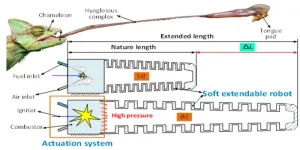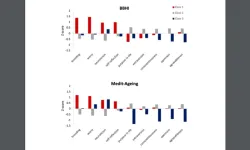(Press-News.org) BALTIMORE, Md. (March 13, 2023) – Scientists led by the Lieber Institute for Brain Development are studying how a mother’s SARS-CoV-2 infection during pregnancy affects the biology of the placenta and the corresponding trajectory of the child’s brain development, including the risk for neurodevelopmental disorders such as schizophrenia and autism. The work is made possible by a $3 million, five-year grant from the Eunice Kennedy Shriver National Institute of Child Health & Human Development, part of the National Institutes of Health.
The project announced today stems from a collaboration between the Lieber Institute for Brain Development on the Johns Hopkins medical campus in Baltimore, Children’s National Hospital in Washington, D.C., and the Women’s Health Integrated Research Center at Inova Health System in Virginia.
The group aims for a clearer picture of how a mother’s SARS-CoV-2 infection during pregnancy affects neurodevelopment in utero, the effects of which may manifest early in a child’s life. The researchers hope to understand how the infection interacts with other factors relevant to brain development, including genomic risk for neurodevelopmental disorders, maternal stress and social determinants of health. The team will study whether the relationship between maternal SARS-CoV-2 infection and offspring brain development is mediated by changes in the biology of the placenta and the activation of the mother’s immune system. They will also gauge any differences in the effects of SARS-CoV-2 between female and male children and in the offspring of vaccinated and unvaccinated mothers.
“We know that what happens in the womb is crucial to the early stages of development, particularly of the brain, and we also know that viral infections contracted by pregnant women can place offspring at higher risk for disorders of brain development,” said Gianluca Ursini, M.D., Ph.D., the principal investigator of the project and an investigator at the Lieber Institute for Brain Development. “We suspect that exposure to SARS-CoV-2 in utero may affect the developing brain too, with potential outcomes manifesting later in life in a portion of those born over the course of the pandemic."
The researchers hope to turn their findings into clinical interventions as quickly as possible, Dr. Ursini said.
“We expect that this study, made possible by the generous and visionary funding of the NIH, will benefit this vulnerable population in a timely manner, by informing preventive and therapeutic interventions and guidelines for SARS-CoV-2-exposed women and their infants,” Dr. Ursini explained. “The results of this study could help us understand the mechanism through which other infectious and non-infectious exposures during pregnancy pose a threat to the developing brain.”
Preliminary data show that pregnant people with symptomatic SARS-CoV-2 infections are more likely to have a preterm delivery, abnormalities in the placenta, and prenatal and perinatal complications such as preeclampsia and fetal growth restriction. All these complications have been found to increase a child’s risk of neurodevelopmental disorders later in life.
The study will involve 500 pairs of mothers and babies from northern Virginia, half of whom had symptomatic SARS-CoV-2 infections and half of whom were asymptomatic, along with 400 healthy controls. Dr. Larry Maxwell, President of the Inova Women’s Service Line, and Thomas Conrads, Director of Women’s Health Research for the Inova Women’s Service Line, will coordinate assembly and analysis of biological samples from patients prior to the pandemic as well as at different intervals during the pandemic.
Additionally, the team at Inova will use laser microdissection technology to collect specific cells from the placenta for protein analysis, as well as for use by investigators at the Lieber Institute for Brain Development for genomic testing and RNA sequencing. The genetic and proteomic data will be combined to assess the effects of SARS-CoV-2 infection on the placenta in infected mothers compared to uninfected pregnant women serving as controls.
Sarah Mulkey, M.D., a prenatal-neonatal neurologist at Children’s National Hospital, will lead the neurodevelopmental evaluations of the infants born to mothers with SARS-CoV-2 infection during pregnancy to understand any long-term neurological effects in offspring from mothers cared for at Inova. The researchers will evaluate the children’s neurodevelopment at both 24 and 36 months of age. This work builds upon Dr. Mulkey’s longitudinal neurodevelopmental evaluations in children exposed to Zika virus in utero.
“What we’ve learned is that even when babies don’t have Zika-virus-related birth defects, we still find differences in early child development compared to children who weren’t exposed to Zika virus,” said Dr. Mulkey. “With SARS-CoV-2, there is still so much we don’t know. But by better understanding the long-term impact of COVID exposure during pregnancy, we can ultimately find ways to prevent adverse outcomes.”
The scientists aim to assess the factors that might mediate or moderate the relationship between a mother’s infection and her child’s neurodevelopmental outcomes. These factors include the components of a mother’s immune system, changes in the placenta, gene and protein changes, and fetal sex. They will also consider the impact of social determinants of health, including the conditions in the places where people live, learn, work and play, that contribute to health risks and outcomes.
Notably, the study group from Inova Health System is racially and ethnically diverse and reflects the vulnerable populations highly impacted by the pandemic and health disparities. By identifying the mechanisms at work in neurodevelopmental complications from maternal SARS-CoV-2 infection, scientists hope to discover how to limit or ameliorate any ill effects.
Dr. Ursini, the principal investigator for the project at the Lieber Institute for Brain Development, has focused his research on investigating the role of the early life environment in affecting the pathophysiology of neurodevelopmental disorder. His research has examined placental biology, its relationship to genomic risk for schizophrenia, and how early-life complications might interact with the genome to increase that risk.
“The placenta is a critical organ for research about early child development, though it is most often discarded after birth without investigation,” said Dr. Daniel Weinberger, M.D., Director and CEO of the Lieber Institute for Brain Development and an investigator on this grant.
“The placenta is an organ of the fetus, not the mother,” Dr. Weinberger noted. “It is a rich source of information about the genome and the fetal environment of a person at the time of their birth, with direct implications for the growth and health of the newborn. Throughout development, interactions with the environment make changes in the machinery that regulates the function of a person’s genome. These interactions are thought to underly many developmental disorders such as schizophrenia.”
NIH Program Director Dr. Sai Majji is supportive of this award that will address specific factors or mechanisms that are responsible for brain development following SARS-CoV-2 infection during pregnancy, leading to identifying biomarkers that may allow prognostication for maternal health and the well-being of the offspring.
The project’s Award Number is 1R01HD107140-01A1.
About the Lieber Institute for Brain Development (LIBD)
The mission of the Lieber Institute for Brain Development and the Maltz Research Laboratories is to translate the understanding of basic genetic and molecular mechanisms of schizophrenia and related developmental brain disorders into clinical advances that change the lives of affected individuals. LIBD is an independent, not-for-profit 501(c)(3) organization and a Maryland tax-exempt medical research institute affiliated with the Johns Hopkins University School of Medicine. The Lieber Institute’s brain repository of more than 4,000 human brains is the largest collection of postmortem brains for the study of neuropsychiatric disorders in the world.
END
Scientists to examine whether SARS-CoV-2 infection during pregnancy affects a child’s risk for neurodevelopmental disorders
Study led by the Lieber Institute for Brain Development to examine molecular risk factors found in the placenta; research funded with $3 million grant from the National Institutes of Health
2023-03-13
ELSE PRESS RELEASES FROM THIS DATE:
How new multi-sport facilities can be used after major events
2023-03-13
Communities that are constructing new multi-sport facilities for major events could run the risk of ending up with expensive under-used complexes, but a new study suggests there are several factors that can keep them productive in the long run.
Researchers found that factors such as the location and design of the facility, the formal agreements between operating groups and the breadth of sport and recreation programming offered at the facility all contributed to promoting a legacy of participation post-event.
“Major sporting ...
New technique reduces postoperative complications in prostate cancer surgery
2023-03-12
Surgeons in Germany have shown a small technical change to keyhole surgery for prostate cancer can more than halve one of the most common post-operative complications – where lymphatic fluid collects in the pelvis.
The technique involves creating a small flap in the peritoneum – the lining of the abdomen – and attaching this flap down into the pelvis. This creates a route for lymphatic fluid to escape from the pelvis into the abdomen where it can be more easily absorbed.
The findings ...
UK study finds vasectomies are even safer than reported
2023-03-12
Vasectomies are much less likely to cause complications than expected, according to a new UK study reviewing the outcomes from over 90,000 vasectomies performed over 15 years.
The study, led by researchers from Gloucestershire Hospitals NHS Foundation Trust, is being presented today at the European Association of Urology (EAU) Congress in Milan.
It shows that existing leaflets explaining the potential complications to patients are based on outdated figures.
Around 11,000 vasectomy operations are performed every year ...
Difference between “growers” and “showers” revealed
2023-03-12
A scientific definition to determine whether a man’s erection can be deemed a "grower " or a "shower" has been produced by researchers.
The findings are presented today at the European Association of Urology (EAU) Congress in Milan.
Urologists based at three hospitals and a clinic in Madrid conducted ultrasound scans on 225 men in both flaccid and then erect states.
The researchers, led by Dr Manuel Alonso-Isa, a urologist at the University Hospital HM Puerta del Sur in Madrid, Spain, had hoped to find factors among the men that would predict if they fell into one of these ...
Delaying treatment for localised prostate cancer does not increase mortality risk, trial shows
2023-03-12
Active monitoring of prostate cancer has the same high survival rates after 15 years as radiotherapy or surgery, reports the largest study of its kind today.
The latest findings from the ProtecT trial, led by the Universities of Oxford and Bristol, are presented today at the European Association of Urology (EAU) Congress in Milan and published in the New England Journal of Medicine.
The trial was funded by the National Institute for Health and Care Research (NIHR).
Although men on active monitoring – which involves regular tests to check on the cancer – were more likely to see it progress ...
Clinical trial shows wrist device significantly reduces tics in Tourette syndrome
2023-03-12
The results of the clinical trial of a new wrist device designed to help control the symptoms of Tourette syndrome have shown it significantly reduces the severity and frequency of tics.
The prototype wrist device, which was recently tried out by Lewis Capaldi, delivers electrical pulses to reduce the amount and severity of tics experienced by individuals with Tourette’s and was trialed by 121 people across the UK. The results have been announced in MedRxive.
The device has been developed by scientists at the University of Nottingham and spin-out company Neurotherapuetics Ltd who have recently secured £1m in additional funding to ...
Design of a fuel explosion-based chameleon-like soft robot aided by the comprehensive dynamic model
2023-03-11
A research paper by scientists at the Beijing Institute of Technology and University of Lancaster displayed a recent advancement of using fuel explosion as the power of source to achieve the rapid and powerful motion for the medium-size robots.
The new research paper, published in the journal Cyborg and Bionic Systems, provided a new kind of actuation system for the robotic system, providing a promising patentability to largely improve the working length of the conventional medium-size robotic systems.
“Achieving the rapid and fast motion of the medium-size robot has been a challenging task for many years, …” ...
Looking for risky viruses now to get ahead of future pandemics
2023-03-11
COLUMBUS, Ohio – Most of what scientists know about viruses in animals is the list of nucleotides that compose their genomic sequence – which, while valuable, offers very few hints about a virus’s ability to infect humans.
Rather than let the next outbreak take the world by surprise, two virologists say in a Science Perspective article published today (March 10, 2023) that the scientific community should invest in a four-part research framework to proactively identify animal viruses that might infect humans.
“A lot of financial investment has gone into sequencing viruses in nature and thinking that from sequence alone we’ll be ...
MSU-led international research network welcomes new Ibero-American partner to advance nuclear astrophysics
2023-03-11
EAST LANSING, MI – The International Research Network for Nuclear Astrophysics (IReNA), supported by the National Science Foundation (NSF) and headquartered at Michigan State University (MSU), brings together nuclear physicists, astronomers, and computational scientists to try to answer a long-standing question in science: Where do the elements that make up our world come from?
Founded in 2019, IReNA continues to expand its global reach for cooperation to advance knowledge in nuclear astrophysics, and now welcomes a new network partner: the Ibero-American Network of Nuclear ...
Aging | Cognitive aging and dementia prevention: The time for psychology?
2023-03-11
“[...] there is a need to explore brain mechanisms through which psychological processes may exert their protective or deleterious effects.”
BUFFALO, NY- March 10, 2023 – Aging (listed by MEDLINE/PubMed as "Aging (Albany NY)" and "Aging-US" by Web of Science) published a new editorial paper in Volume 15, Issue 4, entitled, “Cognitive aging and dementia prevention: the time for psychology?”
Modifiable risk and protective factors (e.g. engaging in active lifestyles ...
LAST 30 PRESS RELEASES:
ASU researchers to lead AAAS panel on water insecurity in the United States
ASU professor Anne Stone to present at AAAS Conference in Phoenix on ancient origins of modern disease
Proposals for exploring viruses and skin as the next experimental quantum frontiers share US$30,000 science award
ASU researchers showcase scalable tech solutions for older adults living alone with cognitive decline at AAAS 2026
Scientists identify smooth regional trends in fruit fly survival strategies
Antipathy toward snakes? Your parents likely talked you into that at an early age
Sylvester Cancer Tip Sheet for Feb. 2026
Online exposure to medical misinformation concentrated among older adults
Telehealth improves access to genetic services for adult survivors of childhood cancers
Outdated mortality benchmarks risk missing early signs of famine and delay recognizing mass starvation
Newly discovered bacterium converts carbon dioxide into chemicals using electricity
Flipping and reversing mini-proteins could improve disease treatment
Scientists reveal major hidden source of atmospheric nitrogen pollution in fragile lake basin
Biochar emerges as a powerful tool for soil carbon neutrality and climate mitigation
Tiny cell messengers show big promise for safer protein and gene delivery
AMS releases statement regarding the decision to rescind EPA’s 2009 Endangerment Finding
Parents’ alcohol and drug use influences their children’s consumption, research shows
Modular assembly of chiral nitrogen-bridged rings achieved by palladium-catalyzed diastereoselective and enantioselective cascade cyclization reactions
Promoting civic engagement
AMS Science Preview: Hurricane slowdown, school snow days
Deforestation in the Amazon raises the surface temperature by 3 °C during the dry season
Model more accurately maps the impact of frost on corn crops
How did humans develop sharp vision? Lab-grown retinas show likely answer
Sour grapes? Taste, experience of sour foods depends on individual consumer
At AAAS, professor Krystal Tsosie argues the future of science must be Indigenous-led
From the lab to the living room: Decoding Parkinson’s patients movements in the real world
Research advances in porous materials, as highlighted in the 2025 Nobel Prize in Chemistry
Sally C. Morton, executive vice president of ASU Knowledge Enterprise, presents a bold and practical framework for moving research from discovery to real-world impact
Biochemical parameters in patients with diabetic nephropathy versus individuals with diabetes alone, non-diabetic nephropathy, and healthy controls
Muscular strength and mortality in women ages 63 to 99
[Press-News.org] Scientists to examine whether SARS-CoV-2 infection during pregnancy affects a child’s risk for neurodevelopmental disordersStudy led by the Lieber Institute for Brain Development to examine molecular risk factors found in the placenta; research funded with $3 million grant from the National Institutes of Health



